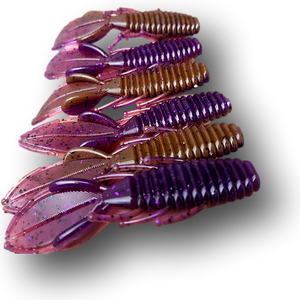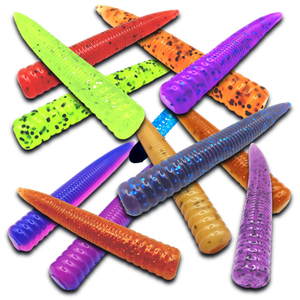
Bigg Mouth Fishing 3.8" Stealth Swimmer Soft Plastic Bait
On-the-water overview (demo copy)
Specs & build (demo copy)
Care & storage (demo copy)
Best ways to fish it (demo)
Bladed Jig Trailer (3/8–1/2 oz)
When & where: Wind + stain; grass/rock transitions; pre‑spawn through fall.
How: Medium retrieve; add 2–3 short pops per cast. Keep the bait perfectly straight to avoid roll‑out.
Why: The Stealth Swimmer’s tight paddle adds lift without fighting the blade—more vibration transfer, less drag.
Buzz Bait Trailer (1/4–3/8 oz) — situational
When & where: Low light, wind lanes, or bank grass with lanes.
How: Slow roll to just break the surface; kill next to targets; restart clean.
Why: Adds lift for slower planing and a clean tail pulse for longer time in the strike zone.
Spinnerbait Trailer (3/8–1/2 oz)
When & where: Wind on grass edges/points; shad spawns; cloudy rock banks.
How: Steady grind with brief stalls after deflections. Willow + Stealth = speed without blowouts.
Why: Tail adds body and a baitfish kick without overpowering the blade cadence.
Swim Jig Trailer (1/4–3/8 oz)
When & where: Coontail/milfoil lanes; docks with shade; rip‑rap.
How: Slow‑to‑medium; kill‑and‑restart after cover; pop to free grass and re‑engage tail.
Why: Tight kick tracks straight in chop and carries speed in grass without rolling.
Underspin (1/8–3/8 oz)
When & where: Suspended bait, points, marinas, and shade lines you can trace on electronics.
How: Count‑down to depth; slow grind with 1–2 stalls; keep the blade tracking not flashing out.
Why: Blade flash + tight tail = clear‑water confidence for roamers and schoolers.
Drop Shot (nose‑hooked)
When & where: Vertical targets and shade lines; fish spotted on forward‑facing sonar.
How: Hold in place with micro shakes; swim it 5–10 ft, then stop and let the tail breathe.
Why: Minnow signal with a subtle paddle—coaxes pressured fish that ignore larger swimmers.
Ned / Finesse Head (1/16–1/8 oz) — situational
When & where: Ultra‑clear water and post‑front conditions when they won’t chase.
How: Thread perfectly straight; slow swim‑and‑glide; drag‑pause on bottom.
Why: Gives a micro‑swimbait look with a narrow tail beat.
Standard (Ball) Jig Head (1/8–1/4 oz)
When & where: Open‑water points, humps, rip‑rap seams.
How: Count‑down; slow roll; tick cover then kill for 1–2 seconds—watch your line jump.
Why: Bread‑and‑butter swimbait delivery for small shad profiles.
Texas Rig (light, 1/16–1/8 oz)
When & where: Sparse grass, brush lanes, or dock walkways.
How: Slow swim with stalls; twitch to free in grass; keep it straight to maintain track.
Why: Weedless control while keeping the baitfish kick intact.
Weighted Swimbait Hook (3/0, 1/8–3/16 oz keel)
When & where: Shallow wind lanes and grass pockets you want to slow‑roll.
How: Grind, stall, grind; keep rod low to track and feel tail cadence.
Why: Keel keeps the 3.8" tracking; adds hang time vs. heavier jigheads.
Weightless / Damiki‑style glide (situational)
When & where: Calm mornings, marinas, shade pockets.
How: Cast past target; count 2–4; short twitches to make the tail breathe; let it pendulum past the ambush point.
Gear Dial‑in (line • rod • reel)
- Jigheads/Underspin: 8–12 lb fluoro on a 7' M/F spinning or 7' ML/MF BFS‑style casting; slow gear (5.6–6.8:1) for cadence control.
- Swim/Spinner/Bladed: 12–16 lb fluoro or 30 lb braid to 12–15 lb leader; 7' M or MH/MF casting; 7.1:1 to burn‑and‑kill on demand.
- Grass lanes: Favor braid‑to‑leader for snappiness freeing the bait; downsize heads (1/8) to carry speed without roll.
Tuning & Mods (quick hits)
- Pin the head with a dot of gel glue on keepers to prevent tearing.
- Heat‑straighten kinked tails: a brief dunk in hot water realigns the paddle.
- Downsize hook (2/0) and lighten heads in ultra‑clear water to keep the kick tight.
- Blade balance: If a bladed jig rolls at high speed, trim 1–2 mm from belly to reduce lift.
Shad / Pearl / White — bright days, shad spawn, suspended bait
- Why: Clean baitfish silhouette that flashes on stalls.
- Use: Spinnerbait/Swim jig on wind; underspin in marinas or over points.
- Tip: Add silver flake in sun; go matte/opaque on overcast so fish track better.
Ghost / Smoke / Ayu — ultra‑clear, high sun, pressured fish
- Why: Translucent body keeps the profile subtle while the tail does the work.
- Use: Jighead slow‑roll; count‑down to brush lines; long even retrieves.
- Tip: Downsize head/hook to maintain a micro tail beat and avoid helicoptering.
Naturals (Green Pumpkin / Baitfish browns) — mixed forage, sun over rock/grass
- Why: Blends craw/bluegill cues with a shad shape—great around grass and docks.
- Use: Swim jig/texas light in lanes; kill‑and‑restart after cover.
- Tip: Gold/green flake shines on sunny banks; darker backs for stain.
Dark / Silhouette (Black Sapphire / Junebug) — mud, low light, night
- Why: Maximum contrast to help fish track the kick.
- Use: Bladed jig and spinnerbait; slow the cadence and let the bait “hang.”
- Tip: Pair with gold or Colorado blades in mud for more thump.
Signal / High‑Viz (Chartreuse, Fire‑Tiger accents) — wind, dingy water, schoolers
- Why: Adds trackability for you and triggers reaction bites.
- Use: Spinnerbait or swim jig in wind; underspin for chasing fish.
- Tip: Keep the body natural and accent just the tail for balance.
- Length: 3.8" (96.5 mm)
- Profile: Compact ribbed swimbait with a tight “stealth” paddle—designed to kick at slow speeds and track in chop/grass.
- Material: Plastisol soft plastic; balanced salt for casting + tail cadence.
- Density/Buoyancy: Neutral‑to‑slightly sinking for level swims on 1/8–1/4 oz heads; hangs longer on keel hooks.
- Best Pairings: Bladed Jig (3/8–1/2), Spinnerbait (3/8–1/2), Swim Jig (1/4–3/8), Underspin (1/8–3/8), Standard Ball Head (1/8–1/4), Weighted Swimbait Hook (3/0, 1/8–3/16), Light Texas (1/16–1/8)
- Pack Qty: Varies by batch; see product options above.
- Availability: Ships promptly when in stock; some colors may be poured to order based on demand.
Care & Storage
Keep baits straight in the original bag to protect the paddle alignment. Separate dark/bright colors to prevent bleed. Rinse after salt use. Bagged (no clamshell).
Plastics Recycling
Don't toss torn baits, recycle or dispose of properly. Learn more here: Soft Plastics Recycling.
On‑the‑Water Notes
- Shad spawn mornings: White/pearl on spinner/swim jigs; burn along grass edges then kill—bites on the hang.
- Cold fronts: Underspin slow‑roll over 12–20 ft; two mid‑retrieve stalls per cast.
- Suspended schools: Count‑down ball head or underspin; long, even retrieves with gentle S‑turns.
Q&A
Q: 3.8" vs. 3.3" or 4.3"—why choose the middle?
A: It’s the small‑shad sweet spot—casts on 1/8–3/8 heads, tracks in light grass, and still convinces pressured fish.
Q: Hook sizes?
A: Ball heads 1/0–2/0; weighted swimbait 3/0; swim/spinner/bladed jig use standard keeper hooks sized for 3.8" trailers.
Related Products
- So Good 6" Jerk Bait (Hand‑poured) — neutral‑glide follow‑up for followers and sight fish.
- Parsons 3.5" Paddle Tail Shiner — finesse paddletail for clear water.
- Doug’s 3.75" Rippin’ Shad — tight shad profile for roamers.
- Doug’s 3.75" Coreshot Rippin’ Shad — high‑contrast core for low‑light or stain.
- Four‑Seven 3.8" FlexFin Shad — similar size with a flexible paddle for slower kicks.
- Liquid Baits 3.8" Fat Swimmer — bulked tail for more thump/presence.
- Doug’s 4" Pintail Shad — dart‑and‑glide alternative for cold water.
- Snoopy’s 4" Ribbed V‑Tail Jerk Shad — ribbed jerk shad when you want less thump, more glide.







